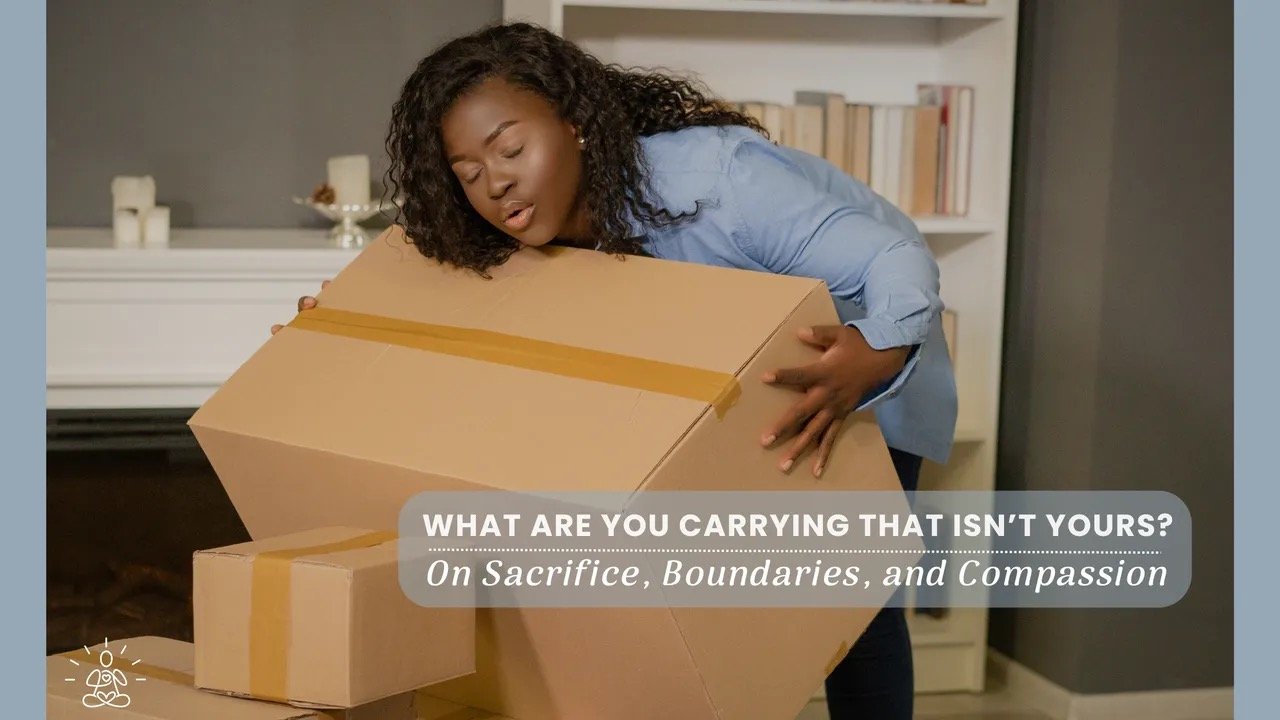What Are You Carrying that Isn't Yours?
Many of us grow up learning to equate love with self-sacrifice. We become the reliable one, the strong one, the caretaker — often long before we ever had a choice. We absorb subtle messages: You’re the responsible one. Don’t make a scene. Be the bigger person. Just let it go.
Over time, this can lead us to carry far more than what is fair or healthy. Not just tasks or responsibilities, but guilt, emotional labor, silence, resentment, and unrealistic expectations. And while we’re busy holding what belongs to everyone else, we may slowly abandon what actually belongs to us: our boundaries, our truth, our emotional needs.
Emotional Labor You Didn’t Sign Up For
There’s a difference between helping out of compassion and taking on someone else’s emotional work as your own. When you’re constantly anticipating others’ needs, smoothing over tension, explaining away poor behavior, or protecting people from the natural consequences of their choices, you’re doing a kind of unpaid, invisible labor, not to mention unintentionally doing others a disservice by standing in the way of their growth.
This kind of caretaking often comes from love — or at least from a deep desire to be seen as good, worthy, or needed. But when it becomes automatic and one-sided, it stops being generous and starts becoming a quiet form of self-erasure.
And here’s the thing: you can’t grow if you’re always shrinking yourself to keep others comfortable.
Boundaries Are Not Punishments
Sometimes people struggle with boundaries because they fear it means cutting others off or creating conflict. But boundaries are not punishments. They are clarifying statements of what you are and aren’t willing to carry.
You can love someone and still say, “This doesn’t work for me.” You can have compassion and still say, “That’s not my responsibility.”
Boundaries are what allow relationships to be sustainable. They are how we communicate our limits and values with clarity. Without them, resentment builds — and resentment is the death of connection.
The Cost of Unchosen Sacrifice
There’s a quiet grief that comes from giving too much of yourself away. It shows up in burnout, anxiety, loneliness, in feeling like no one sees the real you — just the version of you that performs, pleases, and shows up on demand.
So many of my clients are women who have spent years (sometimes decades) carrying burdens that weren’t theirs: the emotional needs of a parent, the fallout of someone else’s decisions, the role of mediator, fixer, overachiever, or peacekeeper. And when they begin to put those burdens down, they don’t always feel lighter at first. They feel guilty. Exposed. Even afraid.
That’s normal. But freedom is rarely instant; it’s something we step into, one decision at a time.
Five Questions to Ask Yourself
If you’ve been feeling overwhelmed, stretched thin, or just a little resentful lately, I invite you to pause and ask yourself:
Is this mine to carry? Sometimes the weight isn’t heavy because you’re weak; it’s heavy because it was never meant for you.
Am I holding this out of love, or out of fear? Fear of disappointing others, of being misunderstood, or of no longer being “needed” can make us cling to roles that no longer serve us.
What would it feel like to let go, just a little? Letting go doesn’t mean abandoning your values. It means making room for your own humanity.
What part of me feels responsible for this? This can help uncover old roles or beliefs you've been carrying, and decide whether they still belong.
What do I need right now that I’ve been ignoring? Sometimes the path to clarity starts with simply turning toward yourself.
A Gentle Nudge Toward Freedom
There’s a popular phrase going around lately that simply says: Let them. Let them be upset. Let them misunderstand you. Let them live with the consequences of their actions.
It’s the central idea behind Mel Robbins’ book, The Let Them Theory, and while the message isn’t new, it’s resonating because so many people, especially women, are tired of holding what was never theirs.
If this speaks to you, I encourage you to explore that message further. Not as a quick fix, but as a deeper practice of letting go, releasing control, and reclaiming space for yourself.
You are not here to carry everything. You are here to live, breathe, and heal. And sometimes, that starts with laying something down.
If you’d like more reflections like this, you’re welcome to follow me on socials, where I share regularly about boundaries, emotional healing, and personal growth. And for those curious about therapy or interested in working together, the Graceful Mind Therapy website or About Maria page offer more information.
You don’t have to do this alone. The more we name these patterns and support one another in breaking them, the more we shift what’s considered normal. Change doesn’t just happen in private moments; it takes root in community. Together, we can create a different kind of culture, one where self-worth isn’t tied to over-functioning and where boundaries are seen as a strength, not a threat.
by Maria Perdomo-Torres, LCSW-S, MHA, CFSW



